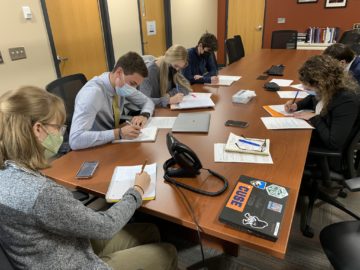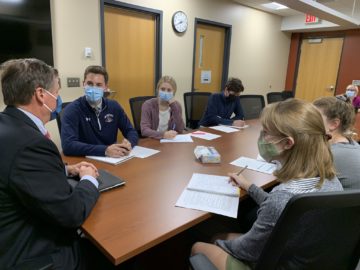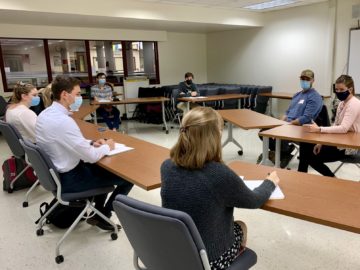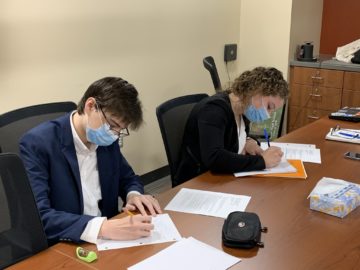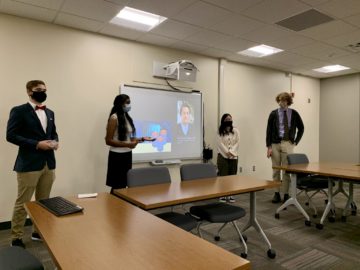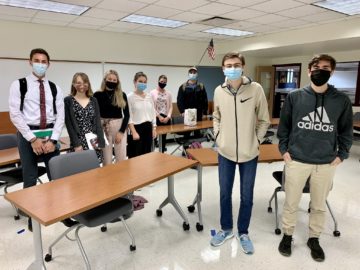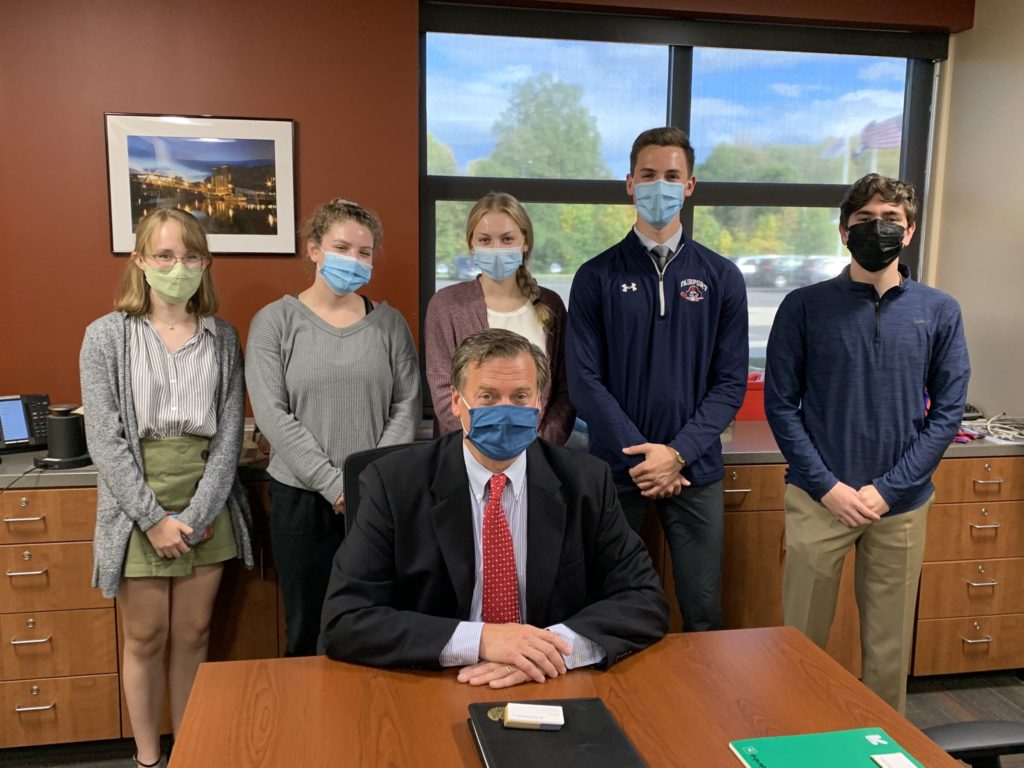Each fall, Fairport High School students have the opportunity to work with government leaders in Washington, D.C. to discuss topics and issues they research as part of a social studies elective course, Senior Leadership Seminar. While students were not able to travel to D.C. this year, they weren’t going to let a pandemic get in the way of making the most of the experience.
The course, which is taught by Fairport High School Social Studies Teachers Kevin Sax and Mike Mallaber, begins in the summer and requires student groups to begin researching a topic currently facing the nation. This year’s topics included climate change, transnational organized crime, Mexican drug cartels/opioid epidemic, nuclear proliferation/North Korea, shootings/gun control, infectious diseases, Cybersecurity and ISIS/counterterrorism.
Instead of traveling to Washington, DC for two days of meetings, the Leadership students conducted two weeks worth of in-person and virtual meetings, with various government officials. Students have met with a host of Congressional staffers to discuss various proposed bills related to their topics. Students also met with various agents from the Federal Bureau of Investigation (FBI), Bureau of Alcohol, Tobacco and Firearms (ATF) and Drug Enforcement Agency (DEA) and officials from the State, Defense, Treasury, Homeland Security, and Energy Departments.
“We are extremely proud of all the work that the students have done to prepare for these meetings,” said Mallaber. “Their hard work has paid off, as the meetings have been extremely interesting and informative.”
After conducting these meetings, students wrote individual policy papers outlining their thoughts on how to address their respective issues. They then worked in their respective groups to develop a presentation that framed the issue, identified who they meet with, what they learned during the course of their respective meetings, and outlined what their group thinks should be done to solve the problem/issue. These presentations were shared with their respective peers, and possibly with parents in the near future.
Student Carter Tochelli and his peers in the Transnational Organized Crime group met with law enforcement officers, federal agents and Congressmen Garemendi’s Legislative Assistant, Iain Hart.
“The virtual experience has certainly been a challenge as far as not being able to have our group meet as regularly as we would like. With the Washington D.C. trip being canceled, it took a little bit of wind out of the sails for some students, wondering how the class would be able to be effective,” Tochelli said. “Having gone through calling offices of members of Congress and being part of the meetings that we were able to set up, I couldn’t be happier I stayed. Setting up our meetings was certainly different than in years past, but almost ended up better with the ability to be flexible over a roughly week and a half to two week period rather than just two days.”
Tochelli added, “Although missing out on seeing Capitol Hill and buildings such as the Hoover Building was a bummer, according to Mr. Sax, some of these meetings have run longer than what they would have if we had been able to go to D.C., allowing us to gain a greater insight into our topic and be more well-versed going into our reflection papers and final presentation. Overall, this class has run very, very smoothly with the transition into being virtual, thanks to our two great Leadership teachers, Mr. Sax and Mr. Mallaber. This class is extremely demanding and Mr. Sax and Mr. Mallaber have been there to assist us every step of the way during this very interesting senior year.”
Student Sarah Danesh and her group researched the topics of shootings/gun violence in America. They met with an FBI agent, ATF Assistant Director Danny Board, a lawyer for the families involved in the Sandy Hook shooting, and a bunch of staffers for various members of Congress, including Senator Feinstein, Representative Morelle, and Senator McSally.
“I’ve had an incredible experience in Leadership. The course is unlike any I’ve ever taken before. For instance, instead of a teacher assigning us work, our individual groups guide the research that we do and the topics that we choose to delve further into. Having this independence also developed a sense of camaraderie among my group members, as we had weekly Google Meets together throughout the entire summer, in which we discussed our topic and also what was going on in our lives,” said Danesh. “We’ve been through such a crazy few months together, and it has made us all learn to rely on each other to get through it, whether it be to have a quick FaceTime to work on research together or to hype each other up when we’re nervous before our meetings.”
Danesh added, “I’ve loved the experience of reaching out to members of Congress. At first, I was nervous about making cold calls, but I soon learned how empowering it is to reach out to individuals that are seemingly unreachable and actually be able to schedule meetings. This feeling only grew after having discussions with these important people. After every meeting, I left feeling like my voice mattered. Before this class, I thought I was too young and inexperienced to be knowledgeable about politics, but now I know that age is not a factor. You just have to do your research and use that to develop your opinion about predominant issues. After this class, I know that I will continue to stay updated on current events. Speaking to our experience during the COVID pandemic, Leadership has definitely been different than it was in past years. Despite this distinction, I did not feel that my experience was negatively impacted in any way. If anything, it made people more willing to hop on their computers for a quick online meeting.”
